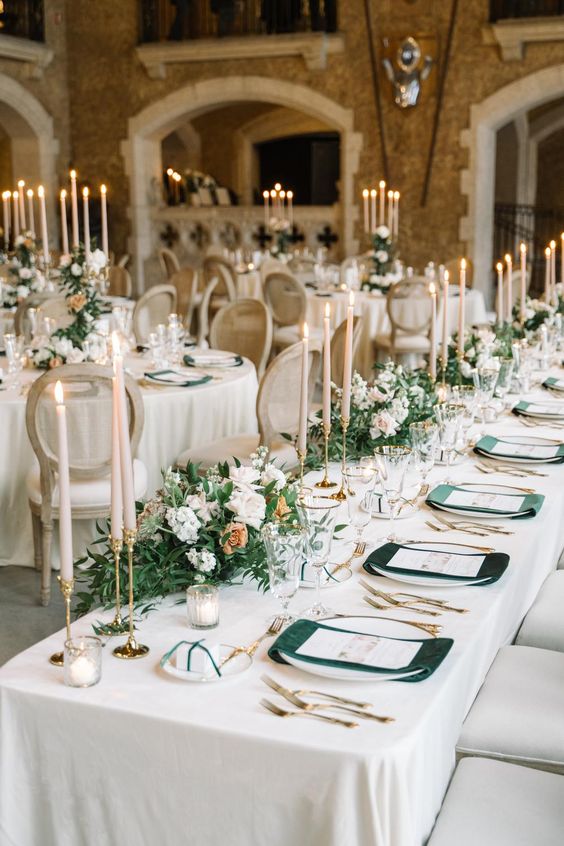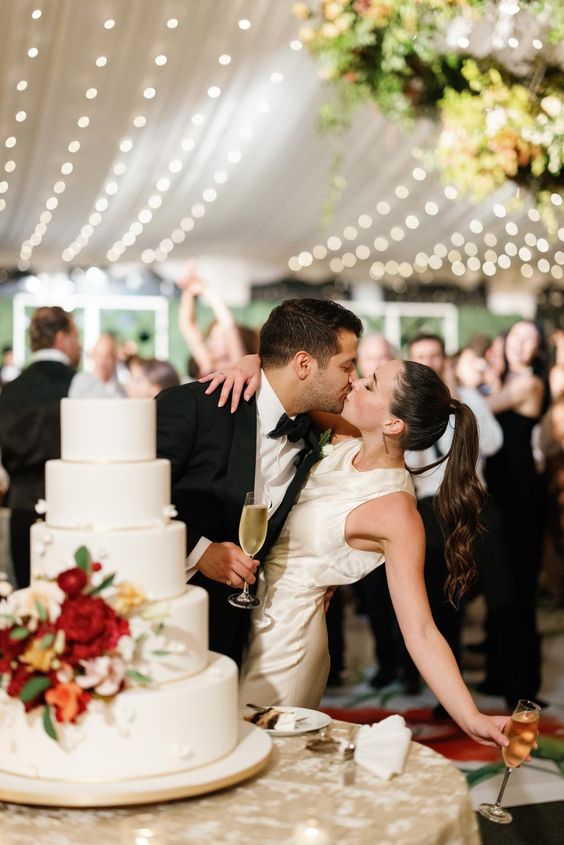Setting up a wedding budget is one of the first (and most important!) steps in planning your big day. Having a well-structured budget not only helps you manage your expenses, but also allows you to focus on what truly matters.
With this being said, where should you actually begin with mapping out your wedding budget? From determining who’s contributing to breaking down costs, there are a number of different factors to consider.
Read on for our step-by-step guide to setting up a comprehensive wedding budget that supports your dream day, without sending you into financial stress!

1. Start With Your Vision
Before diving into the numbers, it’s essential to start with your vision for the day. Sit down with your partner and take some time to discuss what your perfect wedding actually looks like.
For example: Are you dreaming of an intimate beach ceremony with just your nearest and dearest, or a grand ballroom affair with all your extended family and friends? Do you have any non-negotiable elements, such as a live band, gourmet menu or designer dress? What are your top 3 priorities for the day?
Understanding your shared priorities and the overall vibe you want to create will guide your budgeting process and ensure you allocate your funds more effectively. Ps – we have a handy printable worksheet that can help you do exactly this!
2. Determine Who’s Contributing
Next, you’ll want to determine who’s financially contributing to the day. Knowing who’s chipping in and how much they’re willing to spend will give you a clearer picture of your overall budget.
Traditionally, the bride’s family paid for the bulk of the wedding – but these days, many couples are financing their own weddings or splitting costs between both families.
Sit down with your partner and have an open discussion about contributions. Will one or both sets of parents be helping to foot the bill? Are there any other family members who have expressed a desire to contribute?
Keep in mind that financial contributions can often come with strings attached. If your parents are helping financially, they may also feel entitled to make demands about the guest list, venue or other aspects of the wedding. If you think this might be the case, it’s important to have an honest conversation and get clear on any expectations upfront before accepting financial help!
If you and your partner are saving for the wedding yourselves, use this time to look at your savings and calculate how much you can realistically set aside each month until the wedding day. Once you’ve done these calculations, consider how much you’re actually willing to spend on your wedding.
You may want to keep your wedding budget smaller, and prioritize your funds for other things like buying a home. On the flipside, you may decide you’re more than happy to splurge on your special day! It really comes down to your personal preferences and what you value as a couple. The most important thing is that you both agree on the final budget, and that it won’t send you into financial stress.

3. Break Down Your Budget Into Categories
Once you have a total budget in mind, it’s time to break it down into specific categories. This should include everything from “big ticket” items like your venue, catering and photographer right down to smaller expenses like transport and guest favors.
Allocate a portion of your budget to each category, based on your shared vision and priorities that were discussed earlier. For example: if the overall “look” of your wedding is important to you, you should allocate a larger portion of your budget to details like flowers, decor and lighting. On the other hand, if you’re more focused on creating an unforgettable dining experience, you’ll want to prioritize your catering budget.
By prioritizing your spending, you can ensure the most important elements of your wedding are covered, giving you the experience you’ve envisioned. This approach also allows for flexibility if you need to adjust your budget. For example: if an unexpected cost arises, you can reallocate funds from your lower-priority areas without compromising the overall quality of your wedding.
Not sure how to realistically allocate your funds, or what you need to include in your budget breakdown? Our handy budget calculator will do the hard work for you!

4. Start Researching Costs
Researching costs is a crucial part of setting up your wedding budget, as it can really vary depending on your location and the season of your wedding.
Start by getting quotes from different vendors and venues to understand the market rates in your area. This will help you gauge an average price range for each vendor, meaning you can allocate your budget more realistically.
As you begin gathering quotes, be sure to ask each vendor about any additional fees you need to be aware of, and how their payment process works. Most vendors will require a non-refundable deposit to secure their services, with the final payment due within 2 weeks of your wedding.
5. Set Up a Contingency Fund
No matter how meticulously you plan, unexpected expenses are part and parcel of planning a wedding! With this in mind, it’s a good idea to set up a contingency fund to prepare for any surprises.
We’d recommend setting aside at least 5-10% of your total budget for miscellaneous costs. This could be anything from last-minute wedding dress alterations to unexpected venue fees (like rubbish removal or broken glassware on the day).
Having a contingency fund will give you peace of mind, while also preventing you from having to dip into your savings.

6. Track Your Spending
Tracking your spending is key to ensure you don’t accidentally blow out your budget during the wedding planning process!
There are a few different ways you can track your wedding budget, from simple Excel spreadsheets to specific wedding planning apps and software. Whatever method you choose, make sure it includes a detailed record of all payments made and due dates for upcoming payments.
Here at WedSites, our budget planner makes it easy to see your spending at a glance. You can track your spending and set up payment reminders to ensure nothing is overlooked.
Learn more about our wedding budgeting tools here.
7. Review and Adjust as Needed
Finally, make sure you regularly review and adjust your budget throughout the planning process. Set aside time each month to go over your expenses together and ensure everything is on track.
Taking a proactive approach will help you stay in control of your finances and make any necessary adjustments (before it’s too late!).

Wedding Budget FAQs
Still have wedding budget questions? We have answers!
Should we get a loan for our wedding?
Taking out a loan for your wedding is a personal decision and really depends on your financial situation and priorities. While a loan can help you afford your “dream” wedding, it also means starting your married life with debt. Consider whether the stress of repaying a loan is actually worth the benefits of a more extravagant wedding. It’s usually a better idea to plan a wedding within your means to avoid financial stress, or delay your wedding date to give you more time to save.
Should we negotiate with wedding vendors?
Most wedding vendors understand that couples have a budget, and are often willing to work with you to find a solution that meets your needs. While we wouldn’t recommend trying to negotiate their standard rates, there may be some flexibility in pricing or packages. For example: some vendors may be able to offer discounts for off-peak dates, smaller guest lists or for bundling multiple services together.
It doesn’t hurt to ask – but rather than negotiating their rate, you can instead share your budget and ask what can be realistically achieved for that cost.
How much does the average wedding cost?
While research shows that couples are spending anywhere between $30,000 – $50,000 on their wedding, there are no rules on how much a wedding “should” cost. Some couples will spend significantly less, while others will spend significantly more!
Check out our wedding budget breakdown here to see some average costs for different vendors.
Do we need to budget for wedding insurance?
Wedding insurance isn’t mandatory, but it can be a smart investment to protect your big day against unforeseen circumstances. For example: accidents or damage at your wedding, or needing to postpone your special day due to severe weather or illness. Having insurance can definitely provide some peace of mind and financial protection if this is something you’re worried about.
How can we save money on our wedding?
There are so many great ways to save money on your wedding without sacrificing on quality or style! This includes planning a weekday wedding, trimming your guest list, choosing to DIY certain elements or opting for a wedding website in lieu of traditional invitations.






